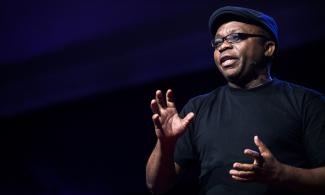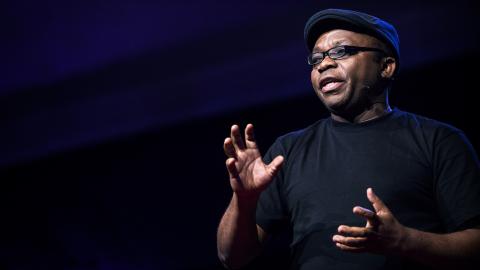
Muslim zealots are using subterfuge to achieve their mission. They are using the police action as a pretext to severely punish Bala for making blasphemous posts on Facebook. Bala's current predicament is part of the scheme and script to penalize him following the verdict of intramental sharia courts of Muslims in Kano and beyond.
The spokesperson of Islamists in Kano has stated that Mubarak Bala would not be tried in a sharia court. That came as a relief, right? But do not be excited. Mr. Bala would still be punished in line with sharia law.
Those who are conversant with the treatment and trial of persons who are accused of blasphemy in Kano understand that those statements were mere propaganda.The declarations were meant to distract and enable Islamists in Kano to try, convict, and inflict maximum punishment on Bala following Sharia, not secular state law. Sharia is part of Islam and many Muslims consider the Islamic law superior to the constitution, and sharia court preeminent above the constitutional court. As part of their religion, Muslims subscribe to sharia and use sharia court accessories to judge and make sense of everyday acts and behaviors of Muslims and non-Muslims alike. In this piece, my thesis is that Mubarak Bala has been subjected to the sharia court process. The ongoing drama in Kano-detention without access to a lawyer and a formal charge is a smokescreen, and substantially a cover to enforce the petitioners' sharia court verdict. Why do I say so?
Look, two types of sharia courts exist in the region-intramental and extramental sharia courts. Intramental sharia court exists in the minds of individual Muslims. This is a sharia court subjectivized and personalized. Every Muslim is a judge in his or her sharia court. Every Muslim adjudicate issues and if the environment permits he or she enforces the verdict. Then there are extramental sharia courts. These are sharia courts objectivized. These courts are usually physical structures where Muslims with expertise on Islamic law meet to adjudicate cases. The judges bear double burden and responsibility. They embody their 'subjective' intramental sharia courts as well as the 'objective' extramental sharia court responsibilities.

Other Muslims bring verdicts from their intramental sharia courts for a re-hearing. Extramental sharia courts serve as appellate courts. In some cases, extramental sharia courts uphold the verdicts of intramental sharia courts. They may also reduce the sentence. On rare occasions, the extramental sharia courts quash judgments of the intramental sharia courts. This seldom happens because such verdicts elicit backlash from Muslim lynch mobs.
Muslims don't need to take verdicts from their intramental sharia court for an extramental court review. Sometimes Muslims enforce the judgment from their intramental courts especially when they suspect that the extramental sharia courts would not uphold the intramental court decisions. It must be noted that extramental sharia courts are not the only appellate courts in operation in Muslim majority states. Extramental secular courts exist. Given that sharia courts often have stiffer penalties for offenses such as apostasy and blasphemy, Muslims in sharia states prefer taking such cases to the extramental sharia courts. They take intramental sharia court verdicts to secular court for appellate hearing only if they must.
Let's take some examples to illustrate how this complicated process plays out in real life. For instance in the case of Gideon Akaluka. He was accused of desecrating the Qur'an in the 90s. Muslims in Kano tried and convicted Akaluka in their intramental sharia courts and sentenced him to death. Given that Akaluka was not a Muslim and would receive a very light sentence or could have had the verdict of the intramental sharia court quashed by an extramental secular court, Muslims in Kano went ahead and enforced their intramental sharia court verdict. They beheaded Akaluka, spiked the head, and paraded it on the streets in Kano. The same dynamics played out in the case of a Christian school teacher whose Muslim students lynched in Gombe in 2007; the Christian woman murdered in Kano for blasphemy in 2016, and a Christian trader who was killed and the body burnt for making blasphemous posts on Facebook the same year. It must be noted that Kano state charged suspected Muslim assailants of the Christian woman in a secular, not in an extramental sharia court. But they were later acquitted.
The situation was slightly different in the case of Kano 9. The nine Muslims were accused of blasphemy in 2015. Muslims in Kano tried them in their intramental sharia courts and sentenced them to death for making statements that were critical of the prophet of Islam. Given that the alleged blasphemers were Muslims, they were brought and charged before an extramental sharia court. Of course, the outcome of the process was a predictable-death penalty. Even at that, angry Muslims were impatient and distrustful of the court process. They suspected that the extramental sharia court might give the accused lighter sentences. These Muslims invaded the extramental sharia court premises and burnt down the building. In response, the extramental sharia court judges decided to try the accused in a closed hearing and later sentenced them to death. The extramental sharia court upheld the intramental sharia court verdict of Muslims in Kano. And there was calm in Kano.
Now in the case of Mubarak Bala, Muslims in Kano have tried and convicted him in their intramental sharia courts for making blasphemous posts on Facebook. Even before the police arrested him, Bala received death threats from Muslims in Kano and beyond. Bala is not a Muslim and could not be taken to an extramental sharia court for an appellate hearing and review of the intramental sharia court verdict. So to give their intramental sharia court ruling some external legitimacy, Kano Muslim zealots ably represented by some sharia court lawyers lodged a petition with the Kano state police command and wanted Bala prosecuted in an extramental secular court. But do they mean to have Bala tried in this 'inferior' court? No, not at all. That is why Bala has been held captive. The police in Kano have refused to comment on his case. Over forty-five days after his arrest, Mubarak Bala has not been charged in court. Bala has not been given access to a lawyer or family members. His whereabouts are unknown. It is only the Muslim zealots who know about his current fate. Mubarak Bala has literally been held hostage. He has suffered serious violations of his human and constitutional rights.
Muslim zealots are using subterfuge to achieve their mission. They are using the police action as a pretext to severely punish Bala for making blasphemous posts on Facebook. Bala's current predicament is part of the scheme and script to penalize him following the verdict of intramental sharia courts of Muslims in Kano and beyond.

